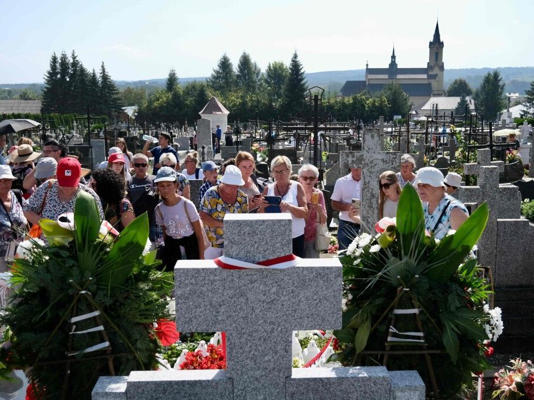
KRAKOW, POLAND — Earlier this month, the Catholic Church in Poland beatified Wiktoria and Jozef Ulma, their children and their unborn child, on what could be the first step on the family’s path toward sainthood.
The Ulmas are already national heroes in this deeply Catholic country, celebrated in postage stamps and coins, and with a museum dedicated to them and the hundreds of other Polish families who helped Jews during the Holocaust.
The Ulmas sheltered two families of Jews, eight people, in their home near the small village of Markowa during the war. On March 24, 1944 German police raided the home. They murdered the eight Jews as well as Jozef and Wiktoria, who was pregnant, and their six children.
The family stands as an important symbol for Poles who portray their history as one of Jews and Catholics living in a peaceful coexistence before it was shattered by the German occupation and the Holocaust. Before the Second World War, Poland was home to an estimated 3.5 million Jews. The Nazis killed 90 per cent of them, as well as hundreds of thousands of Poles.
Wojciech Kolarski is a culture minister in the president’s office, which is separate from the governing party in parliament. He says Poland was subject to a crueler form of Nazi occupation than other European countries, with brutal reprisals facing those who helped Jews.
“They brought their factories of death to the Polish lands,” he said through a translator. “In Poland, even if you gave a glass of water or a slice of bread that was considered help and was punishable by death.”
The Nazis’ six most-deadly extermination camps — Auschwitz-Birkenau, Belzec, Chelmno, Sobibor, Majdanek and Treblinka — operated in occupied Poland during the war and Kolarski said his country has a responsibility to remember the history.
“The Polish state has a special obligation, a special duty to make sure that remembering the Holocaust is preserved,” he said. “We need to make sure that this remembrance is passed on to the future generations.”
How Poland remembers that history, however, has been a subject of intense controversy inside the country and elsewhere.
It doesn’t lend itself to easy narratives. Poland provided a more hospitable home for Jews than many other European countries, but antisemitism was not uncommon before the war , occasionally resulting in violence against Jewish communities . The Catholic Church itself was seen as promoting antisemitism. And the postwar reputation of Poles has been mixed, with stories of some individual Poles participating in acts of persecution and thousands of others, like the Ulmas, risking themselves to help save Jews from the Nazi ovens.
The small Jewish community that remained in Poland after the war was strongly encouraged to leave by the ruling Communists.
In 2018, the current Law and Justice party government amended the country’s Holocaust denial law to make it illegal to say publicly that Poland or the Polish nation were involved in the Nazi atrocities. After coming under international pressure, including from Israel, the government withdrew the changes. However, people can still face civil penalties for implying that Poles had any kind of active role in the Holocaust.
Jan Gross, a Polish American history professor has faced investigations for libel and has been criticized by the current government for his work that showed several pogroms against Jews in Poland were carried out by Poles — not Nazis — in the early days of the war.
Piotr Wróbel, a history professor at the University of Toronto and the Konstanty Reynert Chair of Polish Studies, said, by and large, the history that Poland tells about its Jewish history is accurate, but it has become politicized by the governing Law and Justice party.
“The government tries to impose a certain narrative showing Poland as the most pure nation of the world,” he said. “Many governments do this; it is not a very original idea.”
Wróbel said the story of the Ulma family and the story of all Poles who saved Jews are worth celebrating, but thinks the way the ruling Law and Justice party has made them part of the nation’s politics is unseemly.
“There’s no doubt whatsoever that the Ulma family were heroes and what they did was absolutely heroic. We should remember them,” he said. “The problem is that using the righteous people for an electoral campaign is very low.”
Poland’s modern-day Jewish community is small, at an estimated 16,000 people in the country of nearly 38 million, but many synagogues around the country have been preserved and protected.
Sebastian Rudol, deputy director of the Jewish Community Centre in Krakow, said while there was antisemitism in Poland both before and after the war, there was a reason that Poland had the largest Jewish community in Europe.
“Jews were generally accepted in Poland when they weren’t necessarily accepted in other places in Europe,” he said.
The centre today caters to the small community and has also started a program to help Ukrainian refugees. It also helps people who discover through ancestry searches or their parents’ deathbed confessions that they’re Jewish, a part of their history the family erased to survive.
“Most of the Holocaust survivors are people who survived in hiding, either because they went east (fleeing to Russia), or because they were given out by their family members to non-Jewish families.”
Rudol said the contemporary community sees the debate about responsibility as more nuanced and worthy of further discussion.
“What we try to do is we try to expose people to the idea that war is complicated and it brings out the best and the worst in people,” he said. “Did Poland perpetrate the Holocaust? No. Were there Poles who contributed to the suffering of the Jews? Yes.”
Source: National Post

